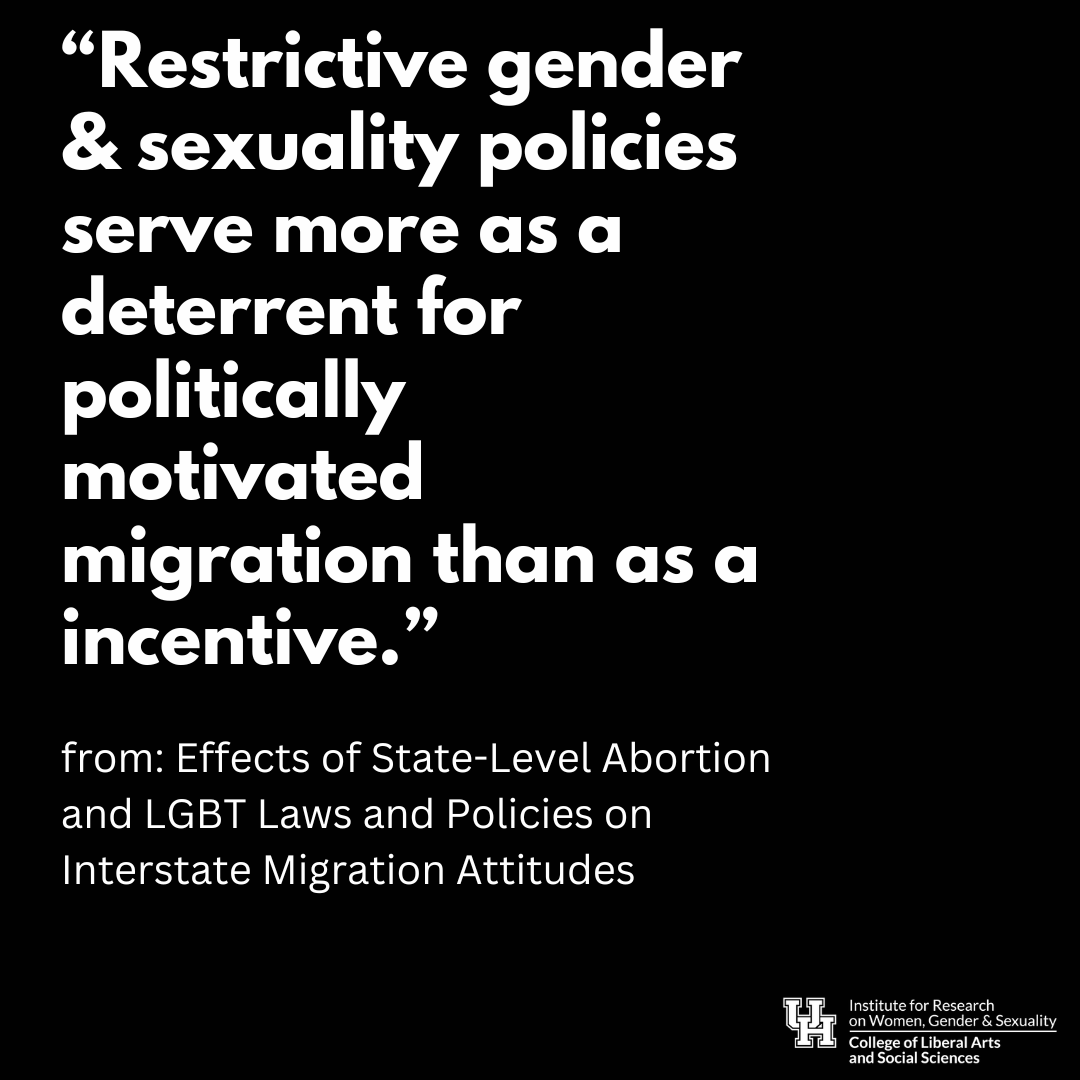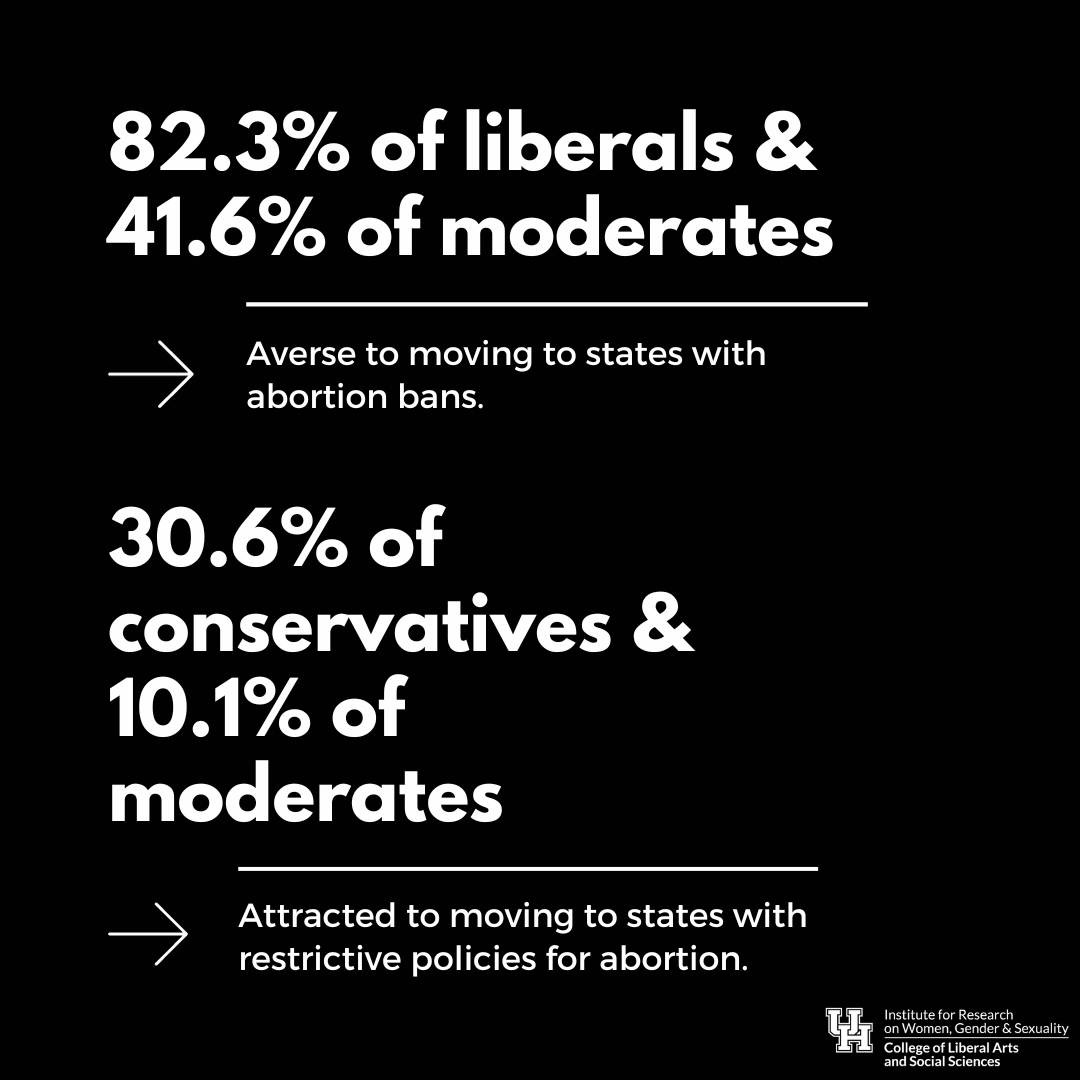Effects of State-Level Abortion and LGBT Laws and Policies on Interstate Migration Attitudes
Effects of State-Level Abortion and LGBT Laws and Policies on Interstate Migration Attitudes
—Amanda K. Baumle, Audrey K. Miller, Elizabeth Gregory, November 2023
SYNOPSIS NOVEMBER 2023
In recent years, record numbers of laws have been proposed and enacted across the United States restricting abortion rights and the rights of persons identifying as lesbian, gay, bisexual, and/or transgender (LGBT). The patchwork of laws and policies across states has produced variable access to rights for individuals, their loved ones, and their neighbors, depending on where they live. In this study, we examined how state-level laws and policies restricting gender and sexuality rights influence attitudes about the desirability of interstate migration.
Specifically, drawing on a sample of 1,061 survey participants, we assessed desirability of moving to a state with restrictions on access to abortion, gender-affirming medical care, participation in team sports for transgender individuals, teaching about gender and sexuality in schools, same-sex marriage, and protections from employment discrimination based on sexual orientation. Although not synonymous with migration decisions or behaviors per se, migration attitudes provide an important benchmark for understanding how abortion and LGBT laws and policies influence attitudes about the desirability of states as potential migration destinations.
Political orientation was the strongest predictor of willingness to move to a state with restrictive abortion or LGBT rights laws and policies, with more liberal and moderate individuals expressing greater aversion to such a move compared to conservatives. Nonetheless, we found that the majority of participants overall, including conservatives, expressed aversion or ambivalence to moving to a new state with these restrictive laws, with 82.3% of liberals and 41.6% of moderates averse to moving to states with abortion bans, for example, and only 30.6% of conservatives and 10.1% of moderates attracted by such policies. Further, the political environment of participants’ current state of residence was also important in understanding willingness to move to a state with restrictive laws. Controlling for political orientation, individuals who were residing in states with more liberal abortion laws were less willing to migrate to states with restrictive abortion laws. Relatedly, when controlling for political orientation, individuals who were willing to move to another state for political reasons, and who currently reside in a state that voted Republican in the 2000 presidential election, were more averse to moving to states with restrictive abortion or LGBT laws, whereas those residing in states that voted Democrat were not more or less willing to move. These findings indicate that restrictive gender and sexuality policies serve more as a deterrent for politically motivated migration than as an incentive.
Participants were particularly averse to moving to states with abortion laws that have a reporting requirement for either women, doctors, or others who aid in obtaining an abortion, as well as states that restrict the ability of women to travel to other states for abortions. On the other hand, participants were less averse to moving to states that have restrictions on gender affirming care for children, children participating in sports as a gender different from that assigned at birth, or teaching about gender and sexuality in the classroom. Overall, these findings indicate that: (1) punitive policies toward parents, doctors, etc., are associated with less willingness to migrate to a state, (2) policies that involve children are viewed as less of a deterrent and, for some conservative participants, potentially increase desire to move to a state, and (3) overall, policies restricting transgender rights resulted in less aversion to moving to a state than those restricting abortion or LGB rights.
We also found that a number of characteristics are associated with aversion to moving to states with restrictive abortion and LGBT laws. Black participants (for abortion, transgender, and LGB laws) and those with children in the household (for abortion and LGB laws) expressed less aversion to moving to states with these restrictive laws, although they were still, on average, averse to such moves. In contrast, women (for abortion and LGB laws), gay men and lesbians (for LGB laws), those with LGBT household members (for abortion, transgender, and LGB laws), those with income levels at or above the median (for abortion and LGB laws), and those willing to move to another state for work (for abortion, transgender, or LGB laws) or education (for LGB laws) were more averse than others to moving to states with restrictive abortion and LGBT laws. These findings indicate that would-be migrators weigh implications of restrictive policies for themselves, but also for their network of those they love and seek to protect. If migration attitudes translate to migration decisions, states could experience migration declines if partnered women (and their male or female partners), single women, gay men and lesbians, and those with LGBT family members choose to avoid states with policies suggesting an unfriendly political environment. In addition, these findings suggest that those in higher-earning occupations, or those who are invested in work or education opportunities, could be discouraged from moving to the states with these policies. Any such migration decline could have negative economic effects.
A more extensive account of this study with additional tables and analysis has been published in Population Research and Policy Review (2023).

